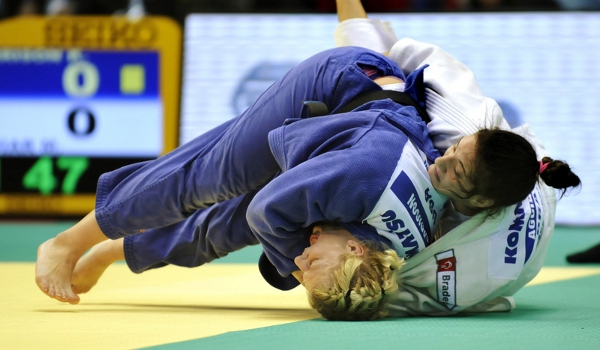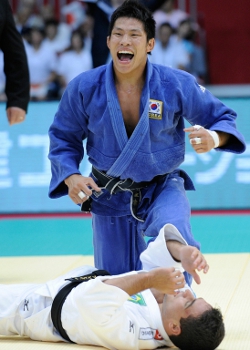Japoneses, líderes de metade do ranking mundial, sul-coreanos, cubanos e norte-americanos estão entre os maiores rivais dos judocas brasileiros mundo afora. Treinos no exterior ajudam a superar as diferenças
 | |
| A norte-americana Kayla Harrison e a brasileira Mayra Aguiar, durante o Mundial-2010, em Tóquio: rivalidade internacional na categoria até 78kg |
Se o futebol brasileiro vê na Argentina um eterno rival, outros esportes têm duelos semelhantes com adversários internacionais. No caso do judô, quem frequentemente representa um risco maior aos atletas verde-amarelos são os asiáticos, como japoneses e sul-coreanos —competidores de países onde a modalidade tem tradição e títulos. Para se ter uma ideia, segundo a versão atualizada do ranking da Federação Internacional de Judô (FIJ), divulgada na última segunda-feira, entre as 14 categorias da modalidade (sete no masculino e igual número no feminino), metade é liderada por japoneses. Quando considerados os três primeiros de cada peso, o número sobe para 16 nipônicos.
“Em geral, as asiáticas são nossas principais adversárias. Elas não cansam, conseguem lutar os cinco minutos, mais o golden score, e também são perigosas no chão”, detalha a técnica da Seleção feminina, Rosicléia Campos. A soberania oriental se reflete também na listagem internacional: entre as mulheres, somente uma categoria (até 70kg) não é liderada por uma japonesa. Nas faixas de pesos até 48kg e até 52kg, da piauiense Sarah Menezes e da brasiliense Érika Miranda, respectivamente, os dois primeiros lugares são de atletas nipônicas.
Além dos japoneses, competidores de outros países também assustam os judocas verde-amarelos mundo afora. “Cada categoria tem um país específico como rival no mundo”, aponta a técnica Rosicléia Campos. Uma das maiores rivais da gaúcha Mayra Aguiar (78kg) é a norte-americana Kayla Harrison. Em seis lutas disputadas, três vitórias para cada lado. “As duas têm a mesma idade e estão muito bem ranqueadas, então irão sempre se cruzar em uma final ou semifinal”, destaca a treinadora. Atualmente, Kayla ocupa o segundo lugar no ranking mundial e Mayra, o quinto.
Três perguntas para Kayla Harrison
Kayla Harrison, judoca dos EUA, campeã pan-americana 2011 e líder do ranking mundial na categoria até 78kg
Quem é sua maior oponente no momento?
A Mayra (Aguiar) é, definitivamente, quem eu considero a minha maior rival. Eu a respeito muito. Ela é uma ótima competidora e campeã. No Mundial do ano passado, no Japão, você derrotou a Mayra. No mês passado, no entanto, no Grand Slam do Rio, a brasileira levou a melhor.
O que mudou de uma temporada para a outra?
Ela fez um excelente trabalho de preparação para o evento. Além disso, sei que, quando luto em casa, entro com todo o meu coração. Acho que isso contou muito em relação à Mayra, que teve o apoio da torcida. No fim do dia,
era a vez dela de brilhar.
Como você analisa o judô do Brasil?
As brasileiras, geralmente, são muito técnicas e espertas. Quando entro para a luta, sei que vou lidar com um judô excepcional e explosivo, sob vários aspectos.
O fantasma de Cuba
Cuba é outra nação que ameaça entrar na lista dos maiores algozes da Seleção Brasileira. O peso-médio Asley Gonzalez, por exemplo, derrotou Tiago Camilo, por ippon, no Grand Slam do Rio de Janeiro, em junho, a dois segundos do fim da luta. Hugo Pessanha também já sofreu nas mãos do cubano, sendo derrotado na Copa do Mundo de São Paulo, no mês passado.
Quebrar o trauma brasileiro diante de Cuba foi justamente a incumbência que Rosicléia Campos assumiu à frente da Seleção feminina. “Em 2007, fomos para um treinamento no Equador e as meninas reclamavam que os homens estavam na Europa. Passamos 21 dias no país. As cubanas estavam lá.
Fiz questão de lutarmos bastante contra elas para desmistificar isso e, assim, nos fortalecemos”, diz Rosicléia. “Antes, estávamos sempre esbarrando nelas, mas, neste ano, ganhamos de Cuba pela primeira vez como equipe, no Pan-Americano de Guadalajara”, comemora. Uma das estratégias adotadas foi filmar todas as lutas em competições para corrigir falhas.
Alguns algozes estrangeiros
 | |
| Jae-Bum Kim, 81kg, Coreia do Sul |
Kim foi Primeiro colocado da categoria, o sul-coreano é hoje o maior adversário do paulista Leandro Guilheiro — e o único que o separa do topo do ranking. O asiático foi vice-campeão nos Jogos Olímpicos de Pequim-2008 e conquistou o ouro no Mundial do ano passado, em Tóquio, vencendo o brasileiro na final. Os dois empataram no tempo regulamentar, mas o golden score definiu a luta a favor de Kim, por wazari.
» Asley Gonzalez Montero, 90kg, Cuba
O cubano frequentemente atrapalha os planos dos brasileiros. No Grand Slam do Rio, no mês passado, por exemplo, o paulista Tiago Camilo dominou o rival durante toda a luta, à frente no placar. Quando faltavam apenas dois segundos para que vencesse a semifinal, o brasileiro levou um ippon e precisou se contentar com o bronze na competição. Na Copa do Mundo de São Paulo, também em junho, foi a vez de Hugo Pessanha sucumbir diante do cubano, na final do campeonato, por wazari e yuko. No ano passado, porém, Hugo derrotou o algoz no Pan-Americano, em San Salvador, na semifinal, e ficou com o ouro.
» Ole Bischof, 81kg, Alemanha
Em 2008, o judoca deixou Tiago Camilo, ainda quando lutava como meio-médio, fora da decisão pelo ouro nas Olimpíadas de Pequim. O alemão bateu o rival brasileiro na chave principal e, na final, venceu o sul-coreano Jaebum Kim, encerrando a competição com o ouro. Camilo terminou com o bronze. Contra Leandro Guilheiro, porém, Bischof caiu ainda nas oitavas de final do Grand Prix de Baku, em janeiro deste ano, quando o brasileiro mais bem colocado do ranking conquistou a prata.
--------------------------------------------------------------------------------------
Japanese and Cubans are among the biggest rivals of the Brazilian judoka
Japanese leaders, half of the world rankings, South Koreans, Cubans and Americans are among the biggest rivals of the Brazilian judo world. Training abroad help to overcome differences.
The U.S. and Brazilian Kayla Harrison Mayra Aguiar, during the 2010 World Cup in Tokyo: international rivalry in the category up to 78kg.
If the Brazilian football in Argentina sees an eternal rival, other sports have similar duels with international opponents. In the case of judo, who often represents a greater risk to athletes are green-yellow Asians, such as Japanese and South Korean competitors, from countries where the sport has a tradition and titles. To get an idea, according to an updated ranking of the International Judo Federation (IJF), issued last Monday, between the categories of the 14 (seven in male and female in equal number), half are led by Japanese . When considering the top three finishers in each weight, the number rises to 16 Nips.
"In general, Asians are our main opponents. They do not tire, they can fight the five minutes, plus the golden score, and are also dangerous on the ground, "explains the technique of female selection, Rosicler Fields. The Eastern Sovereign is also reflected in the international list: among women, only one category (70kg) is led by a Japanese. In the ranges of weights up to 48kg and 52kg of the Piauí and Sarah Menezes brasiliense Erika Miranda, respectively, the top two athletes are Nipponese.
In addition to Japanese competitors from other countries also scare the judo yellow-green world. "Each category has a specific country as a rival in the world," says the technique Rosicler Fields.One of the biggest rivals of the gaucho Mayra Aguiar (78kg) is the North American Kayla Harrison. In six matches played, three victories apiece. "The two are the same age and are well ranked, then they will always cross at a final or semifinal," said the coach.Currently, Kayla is in second place in the world ranking and Mayra, the fifth.
Three questions for Kayla Harrison
Kayla Harrison, U.S. judoka, 2011 Pan American champion and leader of the world rankings in the category up to 78kg.
Who is your biggest opponent right now?
Mayra (Aguiar) is definitely who I consider my main rival. I respect a lot. She's a great competitor and champion. On Sunday last year in Japan, you defeated Mayra. Last month, however, the Grand Slam of Rio, the Brazilian got the better.
What has changed from one season to another?
She did an excellent job of preparing for the event. Also, I know that when I fight at home, I go with all my heart. I think it said much about the Mayra, who had the support of the fans. At the end of the day was her turn to shine.
How do you see judo in Brazil?
The Brazilians are generally very technical and smart. When I go to fight, I know I will deal with an exceptional judo and explosive in many ways.
The ghost of Cuba
Cuba is another nation that threatens to enter the list of the biggest perpetrators of the Brazilian. The weight-average Asley Gonzalez, for example, defeated Tiago Camilo, for ippon in the Grand Slam of Rio de Janeiro in June, two seconds from the end of the fight. Hugo Pessanha has also suffered at the hands of Cubans, being defeated in World Cup Sao Paulo last month.
Breaking the Brazilian trauma before Cuba was precisely the task which took Rosicler Fields ahead of the women's team. "In 2007 we went to a training in Ecuador and the girls complained that the men were in Europe. We spent 21 days in the country. The Cubans were there.
I made sure to fight against them enough to demystify it and thus are strengthened, "says Rosicler. "Before, we were always bumping into them, but this year, won for the first time in Cuba as a team at the Pan American Games in Guadalajara," celebrates.One of the strategies was to film all the struggles to correct failures in competitions.
Some foreign torturers
Jae-Bum Kim, 81kg, South Korea
Kim was first placed in the category, the South Korean is now the biggest opponent of São Paulo Leandro Guilheiro - and one that separates the top ranking. Asian was runner-up in Beijing Olympics-2008 and won the gold in the World last year in Tokyo, beating Brazil in the final. The two tied in regulation time, but the golden score defined the fight in favor of Kim, for wazari.
Asley Gonzalez Montero, 90kg, Cuba
The Cuban often disrupts the plans of the Brazilians. In the Rio Grand Slam last month, for example, the São Paulo Tiago Camilo rival dominated throughout the fight ahead on the scoreboard.When there were only two seconds to win the semifinal, the Brazilians took an ippon and had to settle for bronze in the competition. At the World Cup of São Paulo, also in June, it was time for Hugo Pessanha succumbs to Cuba in the championship game, and wazari by yuko. Last year, however, Hugo beat the hangman in the Pan-American in San Salvador, in the semifinals, and won gold.
Ole Bischof, 81kg, Germany
In 2008, the judoka left Tiago Camilo, even when fighting as a welterweight, out of the decision by the gold at the Beijing Olympics. The German beat in the main Brazilian rival, and in the final, beat South Korean Kim Jaebum, ending the competition with gold. Camilo finished with the bronze. Against Leandro Guilheiro, however, Bischof fell even in the round of the Grand Prix in Baku in January this year when the top-ranked Brazilian won the silver ranking.
